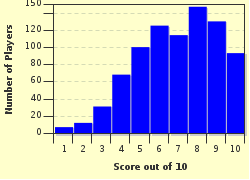Quiz Answer Key and Fun Facts
1. In January 1066, English king Edward the Confessor died without leaving behind any progeny. On his deathbed, who did he designate as his successor?
2. A tenuous thread linked William I to Edward the Confessor, and William used this as his basis to England's throne. How were the two men related?
3. Before the Norman Conquest, what was the distinctly unflattering nickname bestowed upon William I?
4. Although Edward had voiced his opinion regarding his choice of heir, who had the right to elect England's king?
5. Once Harold became king of England, which one of his brothers rebelled against him?
6. Who was the first person to invade England in 1066?
7. What reward did William promise soldiers who would help him conquer England, using their own weapons and horses?
8. William's army was due to sail on August 12, 1066, but it was delayed for a few days. Why?
9. On October 14, 1066 Harold died in the Battle of Hastings. According to tradition, how was his body found among the carnage?
10. Like the conqueror Canute before him, William let many Anglo-Saxon landholders keep their lands.
Source: Author
pagiedamon
This quiz was reviewed by FunTrivia editor
bloomsby before going online.
Any errors found in FunTrivia content are routinely corrected through our feedback system.

